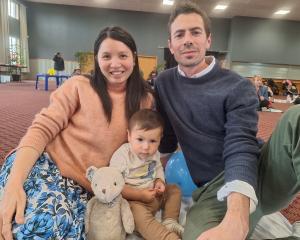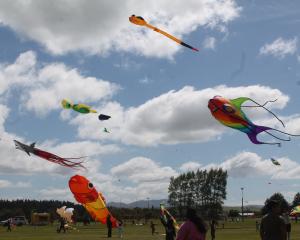Survival instincts and training kicked in for the three men in Monday's helicopter crash in the Auckland Islands.
The twin-engined BK117 helicopter, a ''highly robust'' aircraft commonly used by rescue services in New Zealand, sank about two minutes after hitting the water.
It took the trio, wearing warm but bulky immersion suits, 20 minutes to swim about 300m to the island, where they had to ''fight their way'' through a kelp field to get ashore.
With one torch between them, they skirted around high cliffs to find a way up on to flat ground, then clambered up into a rata forest.

Southern Lakes Helicopters pilot Andrew Hefford was discharged from Southland Hospital yesterday afternoon and was expected back in Te Anau by evening.
His colleagues, winch operator Lester Stevens and St John paramedic John Lambeth, who were discharged from hospital on Tuesday with minor injuries, took part in a debrief at the company's base in Te Anau yesterday to prepare for the arrival of traffic accident investigators.
Although the pair had clear recollections of what had happened immediately after crashing into the sea, the company still had no idea what had caused the accident, Southern Lakes chief executive Sir Richard Hayes said after the debrief.
All three men were physically ''pretty good considering what they went through'', he said.
''They ended up in the sea an hour after dark, but were able to extract themselves.
''The training kicks in - they've done the HUET [Helicopter Underwater Escape Training] - it's second nature to them now.''
Mr Stevens, knocked unconscious on impact, did not remember exiting the aircraft, but came to in the water.
''It was John who grabbed him.''
The moment one of Sir Richard's crew spotted the men - 15 hours after all communication with the trio was suddenly lost - was an ''incredible feeling''.
He had been fearing the worst as he flew south to join the search for his missing crew.
''It was the worst flight I've ever had into the Southern Ocean, and I've done more of those than I'd care to remember.
''I'm ever so thankful they're here with us.''
It was the first accident in the company's 40-plus year history, but they were keen to learn all they could about what had gone wrong, and whether there was anything they and others in the aviation industry could improve on.
He was expecting to spend the next couple of days helping the Transport Accident Investigation Commission (TAIC) with its investigation.
Sir Richard was curious to find out what went wrong as the aircraft turned for its approach to the island, which is at the northeastern end of the Auckland Islands group.
The rescue mission, for an ill crewman on a fishing vessel, had been expected to be a pretty straightforward job.
''It was a great night; it was relatively clear visibility.
''There was nothing in the build-up that anything was about to happen.''
Sir Richard said the wrecked aircraft was lying on the seabed worthless, but could be salvaged if TAIC or the Department of Conservation required.
TAIC spokesman Simon Pleasants said yesterday investigators had travelled south to interview the survivors.
The interviews would start an investigation that may include an attempt to raise the helicopter from the ocean.
Mr Pleasants said that would involve talking to salvage operators, after which a decision would be made.
If the helicopter was recovered, the wreckage would be taken to a TAIC facility in Wellington.
Investigations usually took about 18 months, but could take longer.
Southern Lakes Helicopters operations manager Lloyd Matheson said along with the TAIC investigation, the Civil Aviation Authority would investigate.
The company itself would also conduct an internal investigation, all standard procedure after a crash.
Mr Lambeth was interviewed yesterday by investigators and Mr Stevens was due to be interviewed today.
Mr Hefford would also be interviewed today, if he was up to it the day after his release from hospital, Mr Matheson said.
''It just depends on how Andrew, the pilot, gets on overnight.''














